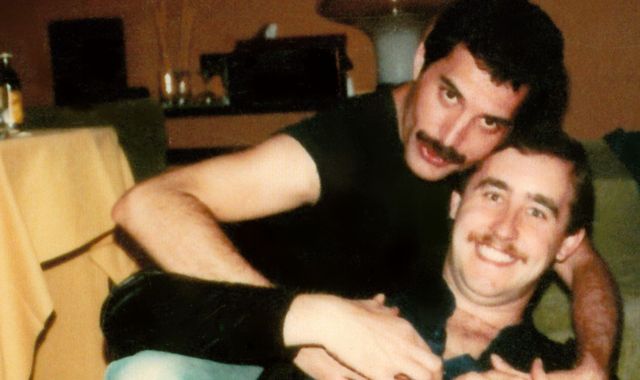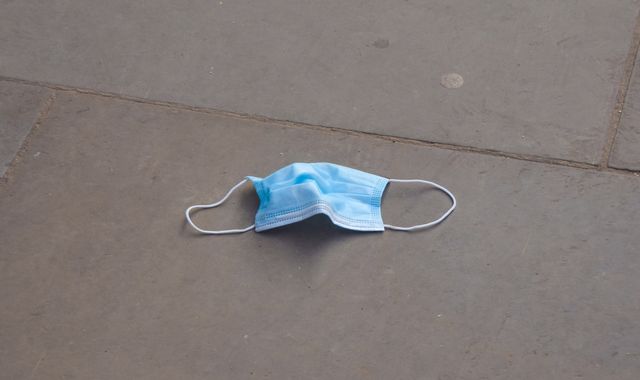Freddie Mercury: The music, the myths and the video they tried to ban
Written by News on 03/11/2019
“You can do anything with my work, but never make me boring.”


In the days before his death in November 1991, Freddie Mercury contemplated how he might be remembered. Of course, as the star surely well knew, there was no way anyone could ever make Freddie Mercury boring.
Twenty-eight years later, there is no danger of him being forgotten.
With the film Bohemian Rhapsody bringing the Queen frontman’s story to the big screen last year, a compilation of his solo work, appropriately titled Never Boring, has now been released, bringing together a specially curated selection of his music, visuals and written and spoken words for the first time.
“It’s true,” says Peter Freestone, the man affectionately named Phoebe by his famous boss. “Freddie Mercury, he was never boring. He could be predictable – but never boring.”
Freestone was Mercury’s personal assistant of 12 years, but also one of his closest friends. There was no job description for his role, he says – chef, waiter, secretary, cleaner, agony aunt – he did it all. No contract was ever signed; the only reminder that this was work was when his bank account topped up at the end of the month.
It was easy living in Mercury’s world, he tells Sky News, because the star made it easy. It became his world, too.
Having met Mercury in 1979, Freestone was there for some of the most memorable gigs, the notorious parties and the biggest highs of Mercury’s and Queen’s career. He was also someone the star confided in after he was diagnosed with AIDS, and the was there, by his side, in the days before his death at the age of 45.
Freestone knew his friend would never be remembered as boring.
“It was always fun,” he says. “Always something different. Freddie had a very low boredom threshold. I never saw him read a book; magazines, yes, but a whole book? I never saw it.
“He could be predictable, though. For example, when we were living in New York, all his friends knew exactly what bar he would be in, from what time until what time, every day of the week.”
Freestone says he knew two Freddies: the performer, the Queen frontman worshipped across the world, was very different from Freddie Mercury the man.
“Both were valid. There was the Freddie who the whole world knows; on the stage, Live Aid, with the whole world in the palm of his hands. And yet there was a person who couldn’t walk in this door on his own. You always hear of Freddie Mercury and his entourage, but it was just a couple of people, friends of his, who made him feel secure. He could not walk into a room of six people on his own.
“Once he’s introduced, he’s the life and soul of the party; he’s happy, talking, joking, laughing, but he couldn’t do it on his own. He was insecure within himself. I think that’s why he was able to create the music and perform as he did, because it was the outlet for that personal insecurity.
“His job was to make every person in the audience feel that he was performing just for them…
“That’s why he had to go out every night, just to get rid of the adrenaline, to get rid of the pressure. When he could go into a bar, he could just hide in a corner and relax and not be under the spotlight.”
In reality, Mercury was a lover of routine, a man you could set your watch by, says Freestone.
“He had this knack of making his life seem ordinary. He would get up every day at 9 o’clock, whether he went to bed at 2 o’clock or if he went to bed at 6 o’clock in the morning. He would have the tea on the side of his bed at 9 o’clock. He would come down, have breakfast, maybe then go into the garden and play with the cats, feed the carp.
“Freddie Mercury, the private person, was a normal human being. He took enjoyment out of the simple things in life; he was lucky because he could afford the more expensive things in life.
“I remember once describing a normal day of going out to someone, maybe going to an auction house, going out to lunch in a restaurant, going to Harrods on the way home. Go out, have an amazing meal in the evening. Which was… a normal day. People used to say, ‘but that’s not reality’. But it was a real life. It was just different.
“But most people imagine it to be this life of incredible extremes and hedonism, and it wasn’t all like that. Freddie was as much a normal human being as you or I. It’s just he could afford to do things differently. That was all.”
As well as his beloved cats – “if you gave a cat-related gift to Freddie Mercury, you were a friend for life” – another thing the star liked to spend his money on was a party.
For his 39th birthday in September 1985, Mercury sent out invitations to 300 friends, requesting their attendance to his celebrations at a famous transvestite club in Munich. Plane tickets included.
It is one of many of the star’s shindigs that have gone down in rock n roll folklore. Filmed for the video for Living On My Own, the footage was banned by his then record company boss on the grounds of its “perceived promiscuity”. It came to light eight years later, when the single was remixed – and went to the top of the charts.
“I can’t remember it, but yeah, I was there,” Freestone laughs.
“I think it’s just over-protectiveness, that it was banned. But I mean, sex happens in dark corners, even in parties that people go to nowadays, doesn’t it? Not where I go, but, you know, it’s what used to happen. A lot of it is suggestion as opposed to actually physically what happened.
“I’ve never really understood this censorship business because the thing is, one year it’s banned and then the next year, oh, this ban is lifted and things are 10 times more obvious than the thing that was banned 12 months before. I don’t understand that at all.
“Because it’s not your run-of-the mill party, it becomes decadent and hedonism and extravagant. But I’m sure there’s a lot more goes on at parties at home than went on in a lot of these parties.”
There were a lot of stories surrounding Mercury and his parties and wild nights out, says Freestone; one of the most famous being that the Queen frontman, along with Cleo Rocos and Kenny Everett, once took Princess Diana, dressed as a man so as to hide her identity, out to a famous gay bar.
Sorry, says Freestone. The story is urban legend. “It didn’t happen. Maybe she went with Kenny and Cleo, but Freddie was certainly not involved. He actually never met her.
“There’s a lot of rumours that we could destroy, but… no. That never really happened.”
When Freestone looked on as the now Oscar-winning Bohemian Rhapsody was being filmed, he says it was his life as well as Mercury’s that he saw on screen.
“It sounds incredibly stage but it was my life up there as well,” he says. “Watching some of those scenes being filmed was really strange.”
While there was some criticism of the timeline of the film and of scenes that were included for dramatic effect, Freestone says he is proud to have been involved.
What would Mercury have made of it?
“He knew before he died there would be books about him and I suppose must have had an idea there would be a film…
“I understand people’s objections to moving bits and whatever. But when I look at the film, I don’t look at the story, because I know the story, I was in it. Maybe it doesn’t finish how it finished in real life, but there is truth in every scene.
“The acting is amazing. Rami [Malek] believed in Freddie and he was able to bring that through.
“There was that scene where they’re in Jim Beach’s office, where Freddie wants to join the band again – which didn’t really happen, they never split up for Freddie to come back. But, when you see Freddie stand up in that scene, that was exactly the look, the attitude, and the words were exactly what I knew of Freddie Mercury. That could have been Freddie. When we were filming it, I could feel a lump in my throat. And when I watched the film, I had tears coming down me.
“Also the part – which again, didn’t happen like it did in the film – when Freddie tells the band he has AIDS. I cried at that as well.”
Freestone also disagrees with criticism that Mercury’s sexuality was “whitewashed” from the film.
“It was a PG,” he says. “You’re not going to have Freddie jumping in and out of bed with other men all the way through the film. You know, they had people on set controlling how many cigarettes were smoked. All these things. But Jim [Hutton, Mercury’s partner] featured in it. He was there. And even at the end, [it said] Jim lived with Freddie through to the end of his life. It was all there.
“People tend to see what they want to see, and if they don’t, if they’re not handed something on a plate, they’re not happy to work for it, having to use their brain. Everybody wants just to see it and have instant gratification. It’s not a film about sexuality, it’s a film about people and their music.”
Which is exactly what the notoriously private Mercury wanted to be known for.
While he never hid his sexuality, he never wanted it to be a talking point either. It was the same when he was told he had AIDS, the diagnosis coming four years before he confirmed it to the world, just 24 hours before his death.
Freestone now spends time speaking about AIDS in schools and at awareness events.
“What it did for Freddie, it never put him in a depression,” he says. “He never came out with, what am I going to do with my life? It just concentrated him on the music, because nobody knew how long he had, whether it was six weeks, six months, six years. So he knew he just had to get as much music done. And he did more work in those last four-and-a-half-years than he did in the years beforehand. And some of his best work.”
Recalling the moment Mercury broke the news of his diagnosis, he says: “For me it was incredibly hard, because from the very minute he told me, that he confirmed to me he had AIDS, I knew that whatever I did would never help cure him. Anything I did, it would only make his life easier. And that hurt.”
:: Listen to the Backstage podcast on Apple Podcasts, Google Podcasts, Spotify, Spreaker
In the years before his death there was much speculation about his illness. But he learned to ignore the headlines, says Freestone.
“This is one of the reasons he never released a statement about it until that day [before he died], because he just wanted to protect his family and friends.
“If he had said something about it, maybe in 1988, and then nobody saw him for a few weeks, there would be nothing stopping a reporter ringing up his mother and asking if he was dead, and he never wanted to put anybody through anything like that. And he felt it was just something for him and the specific people he told to deal with. Because, you know, and even to this day, really, genuinely, what has anybody’s health got to do with anybody else?
“His health did not define him. His music was what made Freddie Mercury; not Freddie Mercury, the lead singer of Queen who’s dying of AIDS.
“He just didn’t want to talk about it. And nobody has the right to anybody’s privacy. Nobody has the right to go into it to find out this, that and everything else.”
While attitudes towards being gay and have progressed in the 28 years since Mercury’s death, Freestone says he doesn’t believe the star would ever have married a man.
“He was a traditionalist. I think he would be unmarried at this point. He would still be with a man, but he would not have married, I don’t think.
“I don’t know he would be incredibly happy with social media as it is, how it can get into every little wrinkle of life. With regards to sexuality, that was very, very much for the individual. It was not something that should be of interest to the whole world.
“Freddie’s life was about the music. He never hid his homosexuality. I mean, he was out at bars every single night, and never in disguise or anything.
“In those days, you had to have a camera that then had to have film developed and all the rest of it. Now you get your telephone, go click, and it’s around the world.”
But back then, for Mercury, it was all about enjoying life.
“The thing is, life is finite,” says Freestone. “You’ve got to put in as much as you can.”
Freddie Mercury’s Never Boring solo collection is out now
(c) Sky News 2019: Freddie Mercury: The music, the myths and the video they tried to ban







